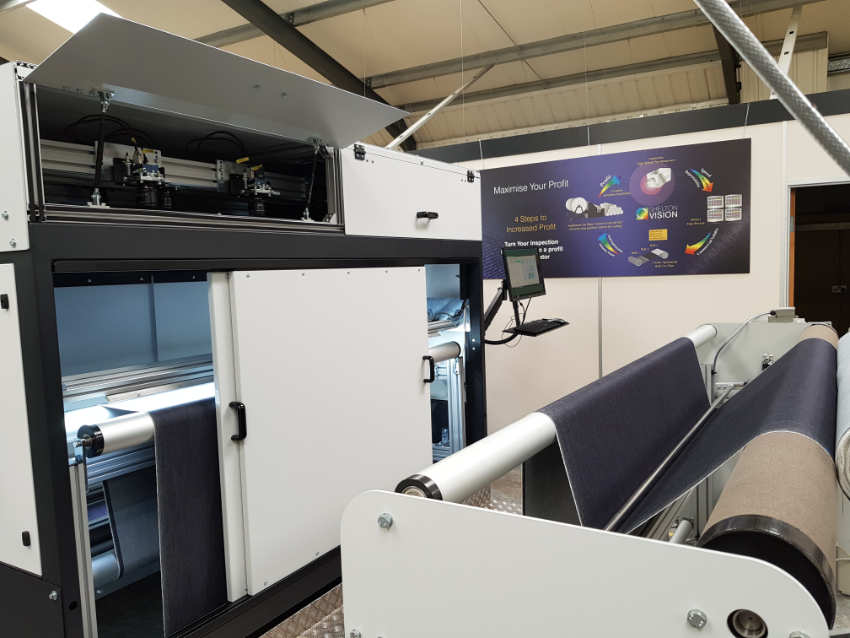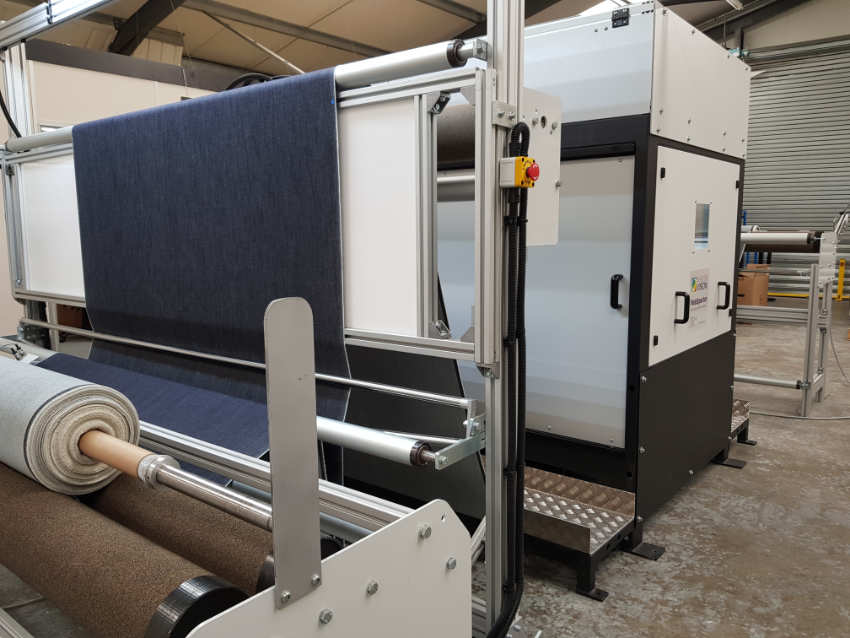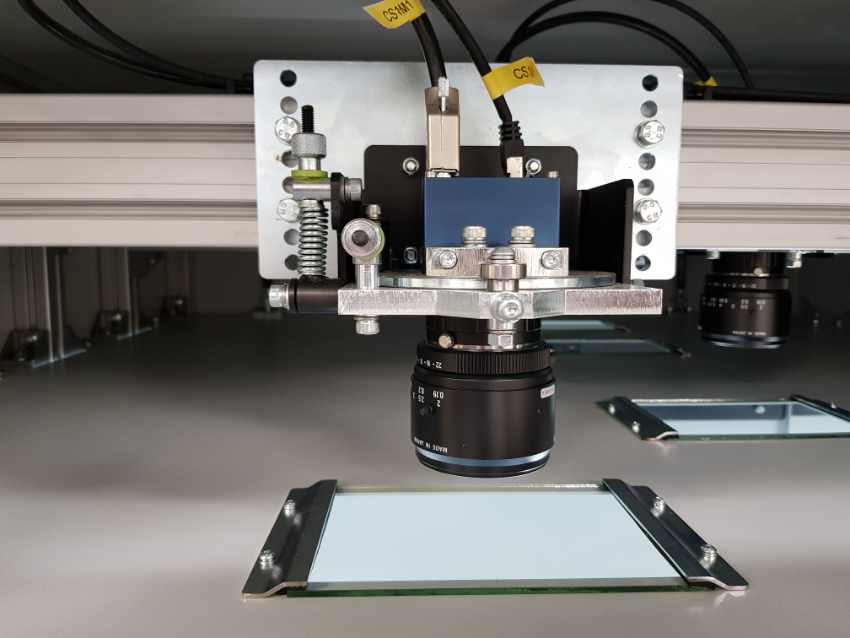Shelton Vision is a pioneering leader in the design, manufacture and application of automated systems for surface, pattern and product inspection across various materials and industries.
A brief description of the company and its activities
Established in 1971, Shelton Vision initially gained recognition for innovations in traditional textile equipment, including manually operated fabric inspection machines. Under the leadership of our CEO, Mark Shelton, we became a market leader in industrial vision systems, specialising in digital camera systems for surface and product inspection. In the early 1990s, we created a subsidiary to develop machine vision for the global textile industry, focusing on system integration, design, software, optics, and AI. We are now a leading provider of advanced automated inspection systems for the textile industry, specialising in innovative solutions that enhance quality control through our cutting-edge WebSpector system, which uses machine learning to detect and classify fabric defects with high accuracy. Our tailored technology supports manufacturers across the global textile market in improving production efficiency, reducing waste, and meeting the industry’s growing demand for sustainable practices.
What are the main areas of activity of the company?
Markets/end uses Interestingly, many studies report that human inspection will detect around 65% of all defects, missing the difference due to the small scope of vision and repetitive nature of the task. Our pioneering work in the textile industry, particularly in patterned fabric inspection, has significant implications for both the automotive and apparel sectors – including sportswear, performance wear, and high end luxury clothing, as well as military end uses (eg. camouflage, parachute fabric), safety critical end use (eg. airbag and filtration fabric) and industrial and architectural (eg. carbon fibre and sunscreen fabrics). Through system integration, we offer tailored solutions through advanced system design, software development, and AI tech. We operate globally, and our UK-built systems are delivered on a turnkey basis, ensuring seamless installation, commissioning, and lifetime support, meeting the rigorous demands of industries worldwide.
What’s the news about new products/services?
Patterned fabric/AI/.
Our WebSpector automated fabric inspection system has been a standout success, particularly after its impressive demonstration at ITMA 2023, where it detected faults on camouflage fabrics at speeds of up to 100 metres a minute. This has resulted in a surge of new orders across various textile sectors, prompting us to expand our team to meet the growing demand. To further support our customers, we have invested in a full-scale high-speed demonstration system at our Leicester, UK headquarters which allows potential clients to witness our technology in action on their own fabrics, as well as the system’s capabilities in real-time defect detection and grading.

Our commitment to innovation and quality is driving a significant shift in the industry, as more companies recognise the benefits of automated inspection systems. We are proud to lead this transformation. Additionally, we have made significant strides in addressing the challenges of inspecting patterned fabrics, which constitute at least 20% of all fabric produced. These fabrics, whether printed or woven with intricate designs, have traditionally posed difficulties for vision systems due to their lack of dimensional precision. Our innovation has opened new commercial opportunities, as we offer the only solution in the market capable of handling both patterned and plain fabrics, which encourages companies that produce both types to invest in our machine vision technology, eliminating the need for manual inspection and covering their entire product range efficiently.
What are the ranges of products/services?
In process, off line, optional features, colour.
We focus on optimising production efficiency and quality through the benefits of our advanced vision systems, to reduce manpower costs and optimise raw material use. By providing accurate inspection data for cutting optimisation, we increase first-quality yield, typically offering a return on investment (ROI) within 6 to 18 months. Subscription-based software options can further reduce ROI periods to a matter of weeks. Our vision systems ensure that defects are identified early to prevent costly errors in subsequent stages and reduce waste by allowing fabric with known defects to be used effectively, thanks to precise defect mapping and smart panel nesting software. We also offer third-party shade measuring and control systems to ensure colour consistency. While our primary focus is the textile industry, we also provide solutions for other sectors, such as inspecting contact lenses with high-speed robotics. Increasingly, we are seeing how flexibly our vision systems can operate in and benefit a multitude of sectors. As a family-owned and operated business, we maintain long-term partnerships with our customers, offering ongoing support and system adaptations to meet evolving business needs through annual support arrangements.
What is the state of the market where you are currently active?
We are experiencing a dynamic shift. While global fabric production volumes have decreased, sectors focused on automation and process improvement are thriving. This counter-cyclical trend is driven by the need for efficiency, waste reduction, and reduced labour costs, making our solutions highly sought after. The automotive industry significantly influences the market, with a growing demand for high-quality fabrics for vehicle interiors and is projected to grow steadily, driven by consumer preferences for comfort and aesthetics. Additionally, the increasing global population continues to drive demand for textiles, supporting market stability. Automation in textile manufacturing is gaining momentum, and this growth is fuelled by the integration of advanced technologies to streamline processes, improve energy efficiency, and meet the rising demand for sustainable practices. We are well-positioned to capitalise on these trends.

What can you tell us about market trends?
Beyond the traditional supply and demand dynamics for textile fabrics and end-use products, there is a notable shift in the workforce landscape away from repetitive and exhausting manual inspection work. The global wave of investment in advanced industries and higher education is reducing the pool of workers willing to perform such a task at low cost. Many textile manufacturing companies are struggling to replace retirees with equally experienced employees, diminishing the availability of manual inspection specialists. As such, we are seeing a growing demand and investment in the automation of the inspection process.
What are the most innovative products/services marketed?
Alongside the aforementioned innovations and services within the textile industry, we are uniquely positioned as the only company with the technology to inspect patterned fabric with high accuracy, setting us apart in the market. Recently, we created a method for synchronising stretch factor measurements between fabric tension during automated inspection and the tension in the rolling, cutting, and packing processes, allowing us to dynamically adapt the cut plan to account for tension and length changes, ensuring precise results. We calculate these adjustments by rapidly counting individual threads over a specified distance within the fabric, eliminating the need for consumables like printing ink or labels, which are typically required otherwise. We increase accuracy, and reduce costs and environmental impact.

What estimations do you have for 2024?
The global textile industry is poised for significant growth, via advancements in production and evolving market trends and we are well-positioned to meet the demand for efficient and accurate quality control systems. Helping manufacturers reduce their environmental footprint and create more sustainable supply chains positions us as a key player in the industry’s shift towards eco-friendly practices which we are particularly passionate about.

Mark Shelton, Shelton Machines Ltd

